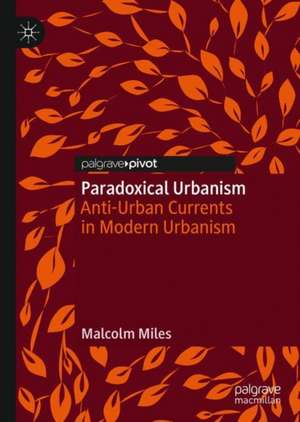Paradoxical Urbanism: Anti-Urban Currents in Modern Urbanism
Autor Malcolm Milesen Limba Engleză Hardback – 6 sep 2020
| Toate formatele și edițiile | Preț | Express |
|---|---|---|
| Paperback (1) | 378.54 lei 6-8 săpt. | |
| Springer Nature Singapore – 7 sep 2021 | 378.54 lei 6-8 săpt. | |
| Hardback (1) | 384.70 lei 6-8 săpt. | |
| Springer Nature Singapore – 6 sep 2020 | 384.70 lei 6-8 săpt. |
Preț: 384.70 lei
Nou
Puncte Express: 577
Preț estimativ în valută:
73.62€ • 76.39$ • 61.53£
73.62€ • 76.39$ • 61.53£
Carte tipărită la comandă
Livrare economică 17-31 martie
Preluare comenzi: 021 569.72.76
Specificații
ISBN-13: 9789811563409
ISBN-10: 9811563403
Pagini: 128
Ilustrații: IX, 128 p. 13 illus.
Dimensiuni: 148 x 210 mm
Greutate: 0.34 kg
Ediția:1st ed. 2021
Editura: Springer Nature Singapore
Colecția Palgrave Pivot
Locul publicării:Singapore, Singapore
ISBN-10: 9811563403
Pagini: 128
Ilustrații: IX, 128 p. 13 illus.
Dimensiuni: 148 x 210 mm
Greutate: 0.34 kg
Ediția:1st ed. 2021
Editura: Springer Nature Singapore
Colecția Palgrave Pivot
Locul publicării:Singapore, Singapore
Cuprins
Chapter 1 Colliding Utopias.- Chapter 2 From Arcadia to Plotlands.- Chapter 3 Drawing a Line.- Chapter 4 The Contradictions of Modernism.- Chapter 5 Post-industrial Ruinscapes.- Chapter 6 An Urban Revolution?.
Notă biografică
Malcolm Miles is a writer on modern and contemporary culture, theory and urbanism. His research spans the humanities and social sciences, drawing on twentieth-century critical theory and more recent reconsiderations of the radical Left. He is author of Cities and Literature (2019), Cities and Culture (2007), and Limits to Culture (2015). He retired as Professor of Cultural Theory in the Architecture School, University of Plymouth in 2016.
Textul de pe ultima copertă
‘Paradoxical Urbanism takes us far away, through competing versions of history, different cities read by different disciplines, takes us into many possible pasts and futures. By doing so, the book asks awkward questions about our cities now—and in the new, C-19 now and whatever might follow, these awkward, complex questions are more pressing than ever. Malcolm Miles sets out a persuasive and pressing case for an alternative and contemporary urban imaginary.’
—Dr Stephen Walker, Head of Architecture, The University of Manchester
—Dr Krzysztof Nawratek, School of Architecture, The University of Sheffield
Modernist urbanism seems progressive, even Utopian: design for a better world through a democratic and humane built environment. But two currents undermine this vision from within: an Arcadianism which turns to a rural idyll as retreat from change and the effects of industrialization; and an instrumentalism by which the humane vision becomes prescriptive and anti-democratic. Malcolm Miles argues that these two currents undermine modernism’s progressive vision. This book examines the roots of modernist urbanism in the seamless, self-contained systems of Cartesian space; and identifies contradictions within modernist urbanism in its instrumentalism and reliance on de-politicised professional expertise. Miles adroitly reviews the postmodern culture of industrial ruinscapes; and posits that if cities are to be places of proximity, diversity, mobility and agency, this will require a move from modernist instrumentalism to a creative and radically democratic co-production of the built environment.
Caracteristici
Offers concise yet incisive critical discussion of how cities reflect and shape philosophical ideas; and how underlying narratives condition the ways in which cities are built, rebuilt and experienced Written accessibly for students in fields including urban studies, cultural and human geographies, sociology, and architecture, and professionals in city planning, development and culture Comprises a variety of first-hand description, polemic and research, as well as some vivid and well-used literary and cultural examples
